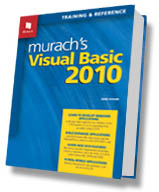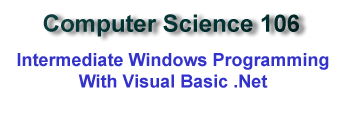 |
Ticket #74948 |
|
|
Instructor: Telephone: E-mail: Web Site: Office hours: Textbook: |
Ronald P. Kessler, Ph.D., MCSE |
|
 |
Murach's Visual Basic 2010 by Anne Boehm 25 chapters, 835 pages, 358 illustrations ISBN: 978-1-890774-58-5 More... |
|
|
Intermediate programming is designed to help you continue to learn how to create more sophisticated programs than we created in CS105. I will teach you the basics of object-oriented programming in order to demonstrate how to solve real-world problems with today’s technology. This course is designed for people who have completed CS105 or have had some programming experience with Visual Basic 2008 & Visual Studio. Evaluation Your final grade in my class will be based on the total number of points you earn. I plan to give you 5 projects to complete outside of class. The grade which you earn will be based upon the total amount of points you receive on the in-class activities, projects, and exams. An exam will be given after we complete each unit. Each exam will be “open book” but you cannot use the computer. Grading will be based upon the following criteria: 90%= A The total possible points in the course will be approximately as follows: Tests 270 (3 exams @ 90) Projects 90 (Approx. 3 projects @ 30) Quizzes 100 (Approx. 5 @ 20) TOTAL 460
Class
Format I will be available after class to help you or give you extra time to work. It is always possible to meet before class if you arrange that with me ahead of time.
Class Drops
Accommodations for Disabilities MAKE-UP EXAMS It is possible to take a make-up exam or quiz during the semester (EXCLUDING THE FINAL) if the exam is missed due to illness or other emergency. Please contact me right away if you cannot attend class when we are having an exam so I can help you with the best solution for your situation. Student Code of Conduct/Civility
Plagiarism
Specific Student Learning Outcomes Upon successful completion of this course students should be able to:
|
||
|
The number of projects and the
points possible for exams, projects and activities are subject to change without
notice. This information is intended to be an accurate overview of this course
so you will know what to expect during the semester. But sometimes, we will need
to modify this plan. The Rancho Santiago Community College District is happy to provide reasonable accommodations for students with disabilities. It is your responsibility to inform me if you have such needs. |
||
